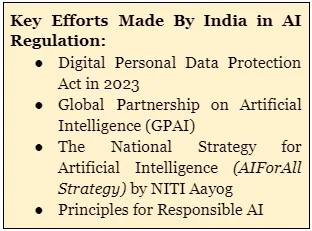Syllabus: GS3/Science and Technology; Emerging Technology
Context
- India stands at the cusp of a transformative era, with Artificial Intelligence (AI) poised to play a pivotal role in its journey towards becoming a global leader. As the world rapidly adapts to AI advancements, India has the potential to harness this technology to drive inclusive economic growth and innovation.
India and Artificial Intelligence
- Artificial Intelligence (AI) is revolutionising the world, and India is no exception. With its vast pool of talent and a burgeoning tech industry, India is poised to become a global leader in AI.
- India has been proactive in fostering AI development. The National Strategy for Artificial Intelligence, crafted by NITI Aayog, outlines a comprehensive approach to harness AI for social and economic benefits.

- Additionally, the IndiaAI mission, with a budget outlay of Rs. 10,371.92 crore, aims to establish a robust AI ecosystem through strategic programs and partnerships.
- India’s AI market is growing rapidly, with an expected compound annual growth rate of 25-35% by 2027, which is driven by significant investments in AI technologies across various sectors, including healthcare, agriculture, education, smart cities, smart mobility and governance.
- It is currently valued at $7-10 billion, and is projected to reach $22 billion.
Sector-wise Transformation
- AI in Healthcare: AI is transforming healthcare in India by improving diagnostic accuracy, personalising treatment plans, and enhancing patient care.
- AI-enabled tools are being used to predict disease outbreaks, manage patient data, and assist in complex surgeries.
- The integration of AI in healthcare is expected to make medical services more accessible and affordable.
- AI in Agriculture: In agriculture, AI is helping farmers increase productivity and reduce costs.
- AI-powered solutions are being used for crop monitoring, soil health analysis, and pest control.
- These technologies enable farmers to make data-driven decisions, leading to better yields and sustainable farming practices.
- AI in Education: AI is also making significant strides in education by personalising learning experiences and improving administrative efficiency.
- AI-driven platforms are being used to create customised learning paths, assess student performance, and provide real-time feedback.
- It ensures that education is tailored to individual needs, enhancing learning outcomes.
How India Can Harness and Leverage the Power of AI?
- Building Robust Infrastructure: To fully capitalise on AI, India must invest in building a robust infrastructure. It includes enhancing computing power, improving data quality, and ensuring widespread internet connectivity.
- Despite generating 20% of the world’s data, India hosts only 2% of data centres — current computing infrastructure represents less than 2% of global capacity — posing a critical bottleneck to technological advancement.
- Fostering Industry-Academia Collaboration: Collaboration between industry and academia is crucial for developing AI capabilities. By aligning educational curricula with industry needs and promoting research and development, India can create a skilled workforce ready to tackle AI challenges.
- Initiatives like the Global Partnership on AI and hosting G20 meetings have already set a favourable geo-political climate.
- Encouraging Startups and Innovation: India’s vibrant startup ecosystem can be a catalyst for AI innovation. Providing risk capital, fostering industry collaboration, and supporting socially impactful AI projects can drive significant transformation across sectors.
- The government’s focus on democratising computing access and attracting top AI talent will further bolster this ecosystem.
- Sector-Specific AI Applications: Tailoring AI applications to specific sectors can maximise its impact. For instance, in logistics, AI can optimise supply chains and reduce inefficiencies.
- Empowering the Workforce: Reskilling and upskilling the workforce is essential to prepare for an AI-driven future. By focusing on Tier-2 and Tier-3 cities and promoting AI ethics education, India can create a diverse and inclusive AI talent pool.
- Initiatives to equip millions with AI skills by 2025 highlight the proactive steps being taken to integrate AI into the workforce.
- Promoting Ethical AI: As AI becomes more integrated into daily life, ensuring ethical use is paramount. Developing guidelines and frameworks for responsible AI use will help mitigate risks and build public trust.
- India’s commitment to ethical AI practices can set a global standard and position it as a leader in responsible AI deployment.
- Interdisciplinary Collaboration: AI implementation requires collaboration across various disciplines and sectors. Fostering such interdisciplinary cooperation can be complex but is essential for holistic AI solutions.
Challenges and the Way Forward
- India’s journey with AI is just beginning, but the potential is immense. With continued investments, strategic initiatives, and a focus on ethical AI, India is well on its way to becoming a global AI powerhouse.
- The transformative impact of AI across various sectors promises a brighter, more efficient, and inclusive future for India.
- Despite the promising developments, there are challenges to AI adoption in India. These include data privacy concerns, lack of skilled workforce, and ethical issues.
- To address these challenges, the government is focusing on skilling initiatives, promoting research in AI ethics, and establishing regulatory frameworks.
| Daily Mains Practice Question [Q] How can India effectively leverage artificial intelligence to address its socio-economic challenges, while ensuring ethical and responsible Artificial Intelligence (AI) development? |
Previous article
E-commerce For Women